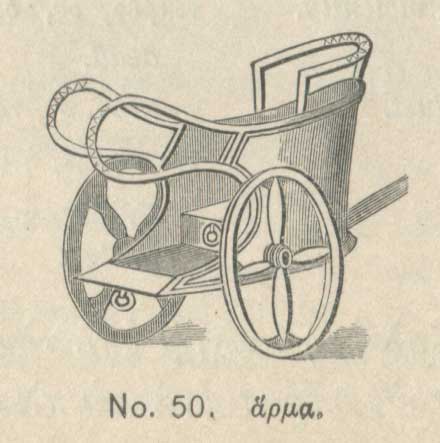THE FIRST GREEK BOOK
BY JOHN WILLIAMS WHITE, PH.D, LL.D., LITT.D.
Professor Of Ancient Greek At Harvard University
This Revision Copyright ©2012 by Shawn Irwin
Lesson LXXII - Second Passive System
S668. The second passive system includes the second aorist and second future passive.
S669. Conjugate the second passive system of στέλλω, send, in 780. Give its synopsis, first in the second aorist, then in the second future.
S670. The stem of the second aorist passive is formed by adding the tense suffix ε to the
verb stem, as στέλλω (στελ), send, second aorist passive stem σταλε (672). This is
lengthened to η in the indicative, and in the other moods before a single consonant in the ending. As a
secondary tense the second aorist passive has augment in the indicative. It follows the inflection of the first aorist passive (770).
S671. The second future passive adds σο/ε to the stem of the second aorist passive, with the tense
suffix ε lengthened to η. It follows the inflection of the first future passive (770).
S672. An ε in the verb stem generally becomes α.
S673. VOCABULARY
βιαίως, (compare βιάζομαι), adverb, violently.
ἑξακόσιοι, αι, α, 600.
κονιορτός, ου, ὁ, cloud of dust.
λευκός, η, ον, white.
μέχρι, conjunction, until.
νεφέλη, ης ἡ, cloud.
νεκρός, οῦ, ὁ, corpse; οἱ νεκροί, the dead.
παλτόν, οῦ, τό, spear, javelin.
τροπή, ῆς, ἡ, (compare τρέπω), rout, defeat
ὑστεραῖος, ᾱ, on (compare ὕστερος), later, following.
S674.
1. Κῦρος ἐπλήγη παλτῷ ὑπὸ τὸν ὀφθαλμὸν βιαίως.
2. εἰ πορευθείη ἐπὶ τοὺς στρατιώτᾱς, ἐκπλαγεῖεν ἂν.
3. ἐφάνη κονιορτὸς ὥσπερ νεφέλη λευκή.
4. οὐ πολλῷ δὲ ὕστερον οἱ λοχᾱγοὶ κατακοπήσονται.
πολλῷ Dative of the degree of difference (867) with ὕστερον, literally later by much, i.e. much later.
5. ὅμως δὲ λέξον, ἔφη, ἐκ τίνος ἐπλήγης.
ἐκ τίνος in consequence of what, i.e. why.
6. ἐνταῦθα οἱ πελτασταὶ ἐδίωκον μέχρι τό δεξιὸν αὖ διεσπάρη .
7. τῇ δὲ ὑστεραίᾳ οὐκ ἐφάνησαν οἱ πολέμλοι, οὐδὲ τῇ τρίτῃ·
ὑστεραίᾳ Dative of the time when (870).
8. ὡς (when) ἡ τροπὴ ἐγένετο, διεσπάρησαν καὶ οἱ Κύρου ἐξακόσιοι εἰς τὸ
διώκειν ὁρμήσαντες.
ἐξακόσιοι Cyrus's bodyguard of 600 horse.
διώκειν in pursuit. The infinitive with the article may, like a noun, depend on a preposition.<
9. ἔφασαν τοὺς λόχους κατακοπῆναι ὑπὸ τῶν Κιλίκων.
10. εἰ μέντοι πλείους συλλεγεῖεν, κινδῡνεύσειεν ἂν διαφθαρῆναι πολὺ τοῦ στρατεύματος.
11. καὶ ἐβουλευόμεθα σὺν τούτοις πῶς ἂν ταφείησαν οἱ τῶν Ἑλλήνων νεκροί.
S675.
1. The general appeared again with a thousand horsemen.
2. The barbarians turned and fled.
Use the aorist passive participle.
3. The soldiers came together and deliberated.
4. Show yourselves the bravest of the captains.
Use the aorist passive.
5. If the army should be scattered, it would be destroyed by the enemy.

S676. The Order of Battle.
καὶ Κῦρος ἐθωρᾱκίζετο καὶ τὰ παλτὰ εἰς τὰσς χεῖρας ἔλαβε, τοῖς
τε ἄλλοις πᾶσι παρήγγελλεν ἐξοπλίζεσθαι. ἔνθα δὴ σὺν πολλῇ σπουδῇ
ἐτάττοντο, Kλέαρχος μὲν τὸ δεξιὸν τοῦ ἐλληνικοῦ ἔχων πρὸς τῷ
Εὐφράτῃ ποταμῷ, Πρόξενος δὲ ἐχόμενος, οἰ δ᾽ ἄλλοι μετὰ τοῦτον,
Μένων δὲ καὶ τὸ στράτευμα τὸ εὐώνυμον κέρας ἔσχε τοῦ Ἑλληνικοῦ.
τοῦ δὲ βαρβαρικοῦ ἱππεῖς μὲν Παφλαγόνες εἰς χῑλίους παρὰ Κλέαρχον
ἐτάχθησαν ἐν τῷ δεξιῷ καὶ τὸ ἐλληνικὸν πελταστικόν, ἐν δὲ τῷ
εὐωνύμῳ Ἀριαῖός τε ὁ Κύρου ὕπαρχος καὶ τὸ ἄλλο βαρβαρικόν.
ἐχόμενος: being next.
εἰς χῑλίους: scilicet ἱππέᾱς, to the number of a thousand (horse).
τῷ εὐωνύμῳ: of the entire Greek force.
See the route on the map.
End Of Chapter
INDEX
Chapter 73
HOME
This Revision Copyright ©2012 by Shawn Irwin
